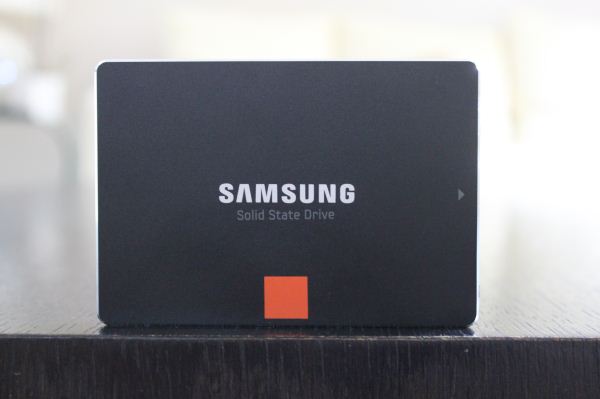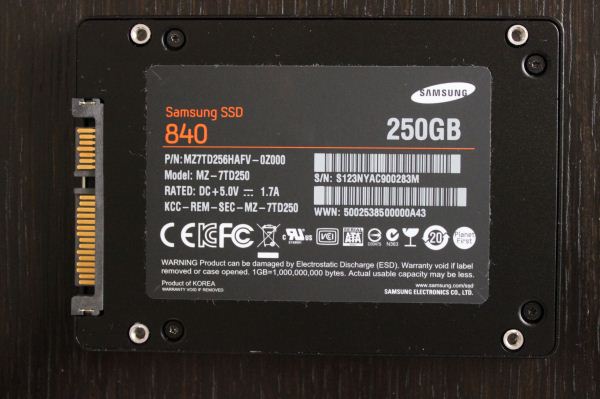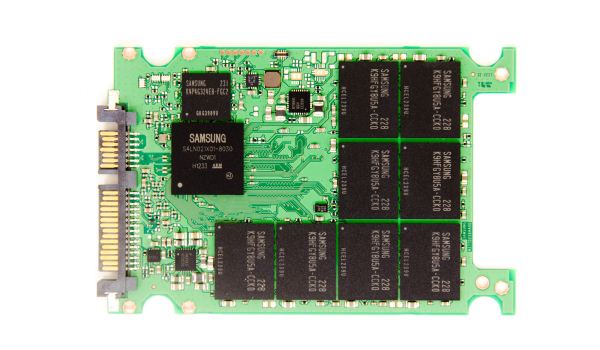Samsung SSD 840 (250GB) Review
by Kristian Vättö on October 8, 2012 12:14 PM EST- Posted in
- Storage
- SSDs
- Samsung
- TLC
- Samsung SSD 840
The Samsung SSD 840
Now it's time to look at the Samsung SSD 840 itself. Performance differences between different capacities are tangible. Sequential write speed in particular increase with larger capacities. With MLC NAND based SSDs 256GB and 512GB models usually perform around the same because 256GB of NAND is able to saturate the limits of the controller but as TLC NAND has longer program times, you will need more NAND dies to hide the additional latency.
| Samsung SSD 840 Specifications | |||
| Capacity | 120GB | 250GB | 500GB |
| Sequential Read | 530MB/s | 540MB/s | 540MB/s |
| Sequential Write | 130MB/s | 250MB/s | 330MB/s |
| 4KB Random Read | 86K IOPS | 96K IOPS | 98K IOPS |
| 4KB Random Write | 32K IOPS | 62K IOPS | 70K IOPS |
| Cache (LPDDR2) | 256MB | 512MB | 512MB |
| Samsung SSD 840 Pro vs 840 vs 830 | ||||
| Samsung SSD 830 (256GB) | Samsung SSD 840 (250GB) | Samsung SSD 840 Pro (256GB) | ||
| Controller | Samsung MCX | Samsung MDX | Samsung MDX | |
| NAND | 27nm Toggle-Mode 1.1 MLC | 21nm Toggle-Mode 2.0 TLC | 21nm Toggle-Mode MLC | |
| Sequential Read | 520MB/s | 540MB/s | 540MB/s | |
| Sequential Write | 400MB/s | 250MB/s | 520MB/s | |
| Random Read | 80K IOPS | 96K IOPS | 100K IOPS | |
| Random Write | 36K IOPS | 62K IOPS | 90K IOPS | |
| Warranty | 3 years | 3 years | 5 years | |
Performance wise the 840 does well but can't challenge the 840 Pro. Read performance is actually nearly on-par with the 840 Pro but write performance is behind due to the use of TLC NAND. I should add that write speeds are still adequate for a consumer drive. In some ways, the 840 can still be a healthy upgrade from the 830. Even though sequential write speed is lower, the increase in random read and write speeds can compensate. Still I suspect most 830 users will want to upgrade to the 840 Pro at least, if they choose not to wait for the next generation of SSDs.
| Samsung SSD 840 Series Pricing | ||||||
| 64GB | 128GB | 256GB | 512GB | |||
| Samsung SSD 840 | N/A | $109.99 (120GB) | $199.99 (250GB) | $449.99 (500GB) | ||
| Samsung SSD 840 Pro | $99.99 | $149.99 | $269.99 | $599.99 | ||
Pricing isn't as aggressive as it could be but keep in mind that the above prices are suggested retail prices. Street prices can easily be ~$20 less and I wouldn't be surprised to see the 120GB SSD 840 retailing for less than $100 (and even $70-80 when on sale). Also note that we're still very early in the production of TLC NAND. Over time you can expect a more appreciable difference in pricing between TLC and MLC NAND.
Based on the chassis alone you can't really tell the difference between the 840 and 840 Pro. Both use a similar matte black plastic design. The 840 measures in at 7mm tall as well, just like the 840 Pro. It's only when you flip the drive around that you can see that it's actually an 840 and not 840 Pro.
Unfortunately, we don't have any pictures of the internals at the moment. Samsung uses special pentalobe screws (similar to MacBook Air) and finding suitable screw drivers in Finland isn't as easy as in the US. In order to get the review out as soon as possible, we decided not to wait for the screwdriver to arrive from the US. We are, however, looking at a PCB that's indentical to the 840 Pro (i.e. eight 32GB TLC NAND packages). The only difference are NAND part numbers.
The 840 Pro
Test System
| CPU |
Intel Core i5-2500K running at 3.3GHz (Turbo and EIST enabled) |
| Motherboard |
AsRock Z68 Pro3 |
| Chipset |
Intel Z68 |
| Chipset Drivers |
Intel 9.1.1.1015 + Intel RST 10.2 |
| Memory | G.Skill RipjawsX DDR3-1600 2 x 4GB (9-9-9-24) |
| Video Card |
XFX AMD Radeon HD 6850 XXX (800MHz core clock; 4.2GHz GDDR5 effective) |
| Video Drivers | AMD Catalyst 10.1 |
| Desktop Resolution | 1920 x 1080 |
| OS | Windows 7 x64 |













86 Comments
View All Comments
SSDFDE - Wednesday, November 14, 2012 - link
... actually what happens if I set the IDE (sorry, its ATA actually) password in BIOS and then move the drive to another computer with no ATA HDD BIOS password set? Will it be readable there as the internal key in the drive of course still is the same?As ATA password is an option only, and setting the ATA password does not alter the internal SSD key, the actual encryption on the drive does not change at all no matter if a ATA password is set or not, right?
BTW: Resetting / generating an new internal key seems to be done with "secure erase" on hardware-encrypted drives with internal encryption key... clearly then its only bitshit on the dive once the old key is lost. Is there an option to do that an the Samsung drive anyway?
JellyRoll - Saturday, November 24, 2012 - link
Digital Signal Processing has nothing to do with the voltage states of the NAND. It is processing of the actual signal that comes from the NAND packages.DSP is used for multiple technologies, from audio to video to radar. These devices do not utilize nand, and DSP has zero interaction with the NAND itself, it merely reduces and corrects the amount of errors that come from the NAND.
here is a primer on DSP: http://www.analog.com/en/content/beginners_guide_t...
There needs to be more research before these incorrect explanations are posted.
"Even though DSP doesn't make NAND immortal, it causes a lot less stress on the NAND, allowing it to last for more P/E cycles than what you would get without DSP."--This statement is entirely untrue, as DSP has no interaction with the NAND itself. It seems there is a bit of guesswork going on when writing this article.
DSP simply corrects errors. With lower endurance NAND you experience more errors.
PanzerIV88 - Thursday, December 27, 2012 - link
I just bought on Boxing Day that Samsung 840 250Gb for 150$ + Taxes. The sequential write speed is what scares the most but other than marketing bs it's actualy what's the less important. There's much more happening into the small files or reading speed which it shines in. I'll definitely replace my Vertex 4 128Gb which isn't as amazing as I thought it was, mostly since I learned that once it reaches 50% capacity, it turns into storage mode instead of performance and the write speed falls of 2 to 3x!!! I can confirm this with benchs I've done, it's really sad..Also thought of doing a Vertex 4 Raid 0 but other than bragging with bench numbers, seriously wtf does 600-800Mb/s is gonna do for a daily light load or gaming?! Totaly nothing more... so I'll save my money.
sriggins - Saturday, March 16, 2013 - link
I have been using an 830 in my MacBook Pro since last October. I use FileVault 2 and do a ton of compiling on the drive. Performance has been steady. How does using OS X encryption affect the life of the drive? Is there any way to tell how many writes have been done so far?brainfuck - Wednesday, July 3, 2013 - link
Is there any way to find the Erase Block Size of Samsung 840 250GB?so that i can align my disk accordingly
thanks
WildBillvms - Wednesday, May 21, 2014 - link
Great Drive , but if you have memory problems click here ----> http://www.billatkinson.net/evo